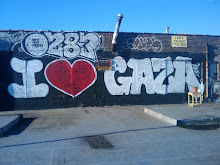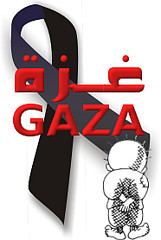at a protest yesterday against israel's continuing violence in gaza, a group of guys next to me started chanting "long live the intifada! long live the intifada!" (for those who don't know, 'intifada' means 'uprising' in Arabic)...and i thought how easy it is for us, over here, far far far away from hunger, true cold, and bombs to vocally support another uprising, without ourselves suffering any of the consequences of it directly. perhaps their call was for literally, another uprising. maybe they were chanting to lend their support to any sort of continued palestinian resistance--armed, intellectual, artistic...whatever form it might take...subsumed under the title of intifada.
peter beaumont wrote today in the guardian of the merits of armed resistance. for as long as i've been critically engaged in the palestinian struggle, i've tried to formulate one opinion on armed resistance-- good or bad? right or wrong? moral or immoral? and still, after years, it is grey in my mind. i know i don't believe in violence as means to an end. i have deep moral qualms about the taking of another person's life, even if that person has committed haneous, unforgivable crimes. i am not comfortable with violence of any form-- physical, emotional, psychological...but at the same time, i know that no resistance movement has ever suceeded which did not have aspects of it which were militant or violent. every independence movement i know of included factions which embraced violence-- from the Black civil rights movement in the US to the Indian independence movement to the anti-apartheid struggles of Africans in South Africa. struggles have always included an array of resistance strategies and actions. Even Patrick Henry, as we learned in 4th grade American history class, espoused the desire, "give me liberty or give me death!"...a life without liberty is none at all...so how do you acheive it? i don't know...
beaumont poses the question, "when do we regard armed resistance as being acceptable?"...which glosses over the fact that "armed resistance" implies that there is something to resist against-- implicit in this question is the acknowledgement that there is an oppressive force which merits resistance...armed or not being the focus of this postulation. and again the onus is borne upon the shoulders of the oppressed to fight their oppression and subjugation in terms acceptable to "the free world" and the judging allies of its oppressors. the oppressed must bear the burden of liberating themselves, politely and inoffensively.
so in turn, i would pose the question, "when do we regard oppression as being acceptable?"
Subscribe to:
Post Comments (Atom)



There's a line from the song "Babylon" on Outkast's ATLiens album (1996) that I think of in these lopsided conflicts:
ReplyDelete"While we rantin' and ravin' about gats/
Man, they made them gats/
They got some shit that'll blow out our backs/
From where they stay at"
...Dunno if that brings us any closer to an answer, but besides the morality, there is definitely the question of practicality. I'm much more convinced by peaceful movements than I am by violent insurrections when one side has so much more fire power. Of course, there's always the issue of immediate survival.
Yes, immediate survival is of course of concern. I think for me...as much as I don't think I could participate in violence, I do see it as strategic TO AN EXTENT. Not violence towards individuals, but all the freedom movements I know of employed some elements of violence alongside those of peaceful resistance. Do you know of any movements that were wholly nonviolent and resulted in independence? Admittedly, my knowledge of other movements is limited, so if you have an example I would love to hear it, because I unfortunately don't know of any...
ReplyDeleteThe first intifada was non-violent, with the exception of stone throwing and malotov cocktails, but it was unarmed. Nil'in demonstrates weekly, non-violently against the apartheid wall...but people forget these examples and the media ignores them, which is dangerous also in a conflict in which opinions are largely formed by 1 minute CNN clips. I don't know...I would like to be convinced that violence is not necessary in resistance but don't have any examples of successful, nonviolent movements...